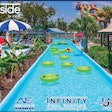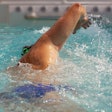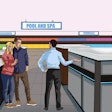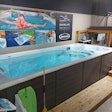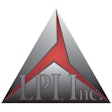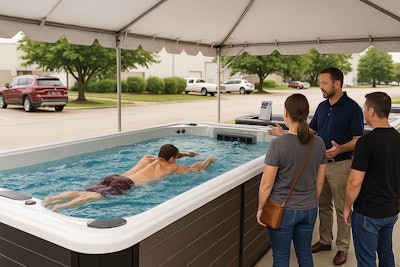
Matt Harper of Leisure Pro Sales Solutions doesn’t mince words about the swim spa market — or the hard truths of selling in today’s climate.
“We’re in a COVID hangover,” Harper says. “We thought that market was real — but it wasn’t. It was falsely created. I’m glad everybody made a lot of money then, but we only win the lottery once, and that lottery is gone. Now, we have to be innovative again. We have to be proactive again. Customers aren’t just walking into showrooms with their checkbooks out. We have to sell again.”
Harper works with spa dealers across the country, helping them run successful in-store and off-site events, train their sales teams, and rethink their strategy in a post-pandemic economy. In his view, swim spas aren’t just a trend — they’re one of the most promising yet underused opportunities in the pool and spa industry.
He believes events — whether instore or off-site — have become one of the most effective tools for moving swim spas. “These gatherings do more than generate leads,” Harper says. “They educate, build trust, and offer a firsthand experience of a product that’s hard to grasp on paper. For something this nuanced, seeing is believing.”
SMALL YARDS, BIG OPPORTUNITY
With rising development costs and shrinking lot sizes, Harper says swim spas offer a smart solution to a growing problem for today’s homeowners.
“Swim spas are one of the fastestgrowing segments in the industry,” he says. “There’s still a major housing shortage, and new homes are going up on much smaller lots. Developers are cramming in as many homes as they can, and rising costs make big backyards — and pools — a lot less realistic.”
But even for those who do have the space for a pool, Harper says swim spas should still be a top consideration because they offer benefits traditional pools and spas can’t deliver on their own.
“I tell all my hot tub dealers: The only reason someone should want a hot tub is if they don’t already have a swim spa,” he says. “It delivers the full-body swimming experience of a pool, the therapeutic benefits of a spa, and the wellness potential of both — all in a compact footprint.
“It’s no longer just a luxury item. It’s a wellness product. That’s where I see the industry going — from recreation to restoration.”
EVENTS THAT CREATE URGENCY, CLOSE SALES
Harper’s business revolves around event-based selling. From state fairs to parking lot pop-ups to community partnerships, he emphasizes that success doesn’t come from spontaneity — it comes from strategy.
“If you’re going to do one event, and that’s it, don’t waste your money,” Harper says. “Events need to be scheduled, planned, and consistent. I see it all the time — dealers doing oneoff, walk-in events or one Costco show. People need to know you’ll be back. It has to be something they look forward to, and it has to be highly organized.”
That level of organization, he adds, starts months in advance. “Events need to be planned six months ahead — or at least three,” he says. “You’ve got to have your permitting in place, correct electrical, access to the spas, signage, delivery schedules, POP, everything. Because if it’s — well, for lack of a better term — half-assed put together, you’re going to get a half-assed result.”
Swim spas add another layer of complexity due to their size and setup requirements. “I’ve seen dealers use large trailers, forklifts, even rollback trucks — the kind used to tow cars — to move these units safely,” Harper explains. “There are real costs involved, so you’ve got to plan for that.”
Location, too, is critical. Harper recommends off-site events in areas with strong visibility and the right customer demographics.
“I like high-traffic areas with a good average income. You don’t want to be out on the backroads of Alabama, like where I am right now,” he jokes. “You want people driving by who didn’t see your Facebook ad going, ‘Hey, there’s a hot tub sale — let’s check it out.’ That kind of visibility really matters.”
While state fairs remain a reliable draw, Harper urges dealers to think beyond the usual. “State fairs are still very good. You get in front of a lot of people,” he says. “But I’ve also seen dealers do great in front of gyms or community centers. If you can set up a swim spa outside a gym for the weekend and work out a deal with the owner — maybe split profits from any swim spas sold — it’s low-cost, high-visibility marketing.”
WELLNESS IN ACTION
Swim spa events are also evolving beyond static product displays. According to Harper, more retailers are leaning into wellness programming — and seeing results.
“You’re seeing a lot more focus on the health benefits,” he says. “Dealers are opting for extracurriculars, including yoga, smoothie bars, and meditation. I’ve had dealers bring in instructors to show customers how to exercise in the swim spa. That way, you’re not just seeing the product — you’re seeing what it can actually do for you, how it works in real time.”
And these aren’t passive demos. Harper recalls one standout event featuring a CrossFit trainer who quickly became the star of the show. “He was just fantastic,” Harper says. “He explained the exercises, showed how long to do them, and kept going — even when no one was paying attention. By the end of the day, he had people fully invested, talking about the health benefits and getting them genuinely excited. His energy turned into one of the best sales tools out there.”
A “TRY-BEFORE-YOU-BUY” STRATEGY, WITH PURPOSE
Wet testing can be a powerful sales tool, Harper says, but only if it’s used strategically.
“If you’re going to offer a try-beforeyou- buy, it has to be positioned as an incentive — it needs real value,” he explains. “It costs the dealer money to set up: filling it, treating the water, running power, getting it ready like it would be in someone’s backyard. It shouldn’t just be another free service.”
For customers who attend events but don’t purchase on-site, a wet test can be a great next step. “But it’s not something you throw in just because they asked,” Harper says. “It should be part of a structured process to help close the sale, not a casual offer.”
He recalls visiting a dealer where the lack of structure completely backfired. “The wife tried the spa for 30 minutes. Then the husband wanted to try it. Then the son. They came back multiple times,” he says. “One salesperson spent the entire day managing that family’s wet test, without ever asking if they were going to buy.”
That’s why, Harper emphasizes, a wet test should never be the beginning of the process. “Those clients coming out of the spa should be writing a check as soon as they get dry clothes on," he says.
BRIDGING THE TRAINING GAP
Many of the struggles dealers face today aren’t just economic — they stem from a gap in sales training that became painfully clear during and after COVID-era hiring.
“If they hired a salesperson during COVID... well, that was never a realistic market, and we’re paying the consequences for it now,” says Harper. “A lot of dealers brought on ‘order takers’ and lost what makes a great salesperson: someone who listens well, asks the right questions, overcomes objections, and knows how to guide a sale.”
That kind of skill is especially critical at events, where customer interactions move fast and the opportunity to close is brief. “You don’t have time to wing it at a parking lot sale or a fair,” Harper says. “You need people who can qualify quickly, handle pushback, and lead the customer through the buying journey — right then and there.”
Harper emphasizes the need for a consistent, repeatable system. “Our business model is process-driven from start to finish — whether in the showroom or under a tent,” he explains. “It starts the moment someone walks in or walks up, and it continues until they leave. Every step matters.”
And that system, he says, is only as strong as the people using it. “We have to be trained again — on closing, on handling objections, on selling with intention,” Harper says. “If we’re not, we fall back into taking orders. And once you hear that first no? Most people fold. They think the customer will come back. But statistically, 93% don’t. I can’t make a living on 7%.”
INTEGRITY STILL MATTERS
Despite all the urgency around sales and strategy, Harper says success still comes down to doing business the right way.
“I’ve been selling spas for a long time, and there’s no reason to lie, no reason to cover something up, no reason to be unethical to be successful in this business,” he says. “Ethics and integrity go a long way with people. You can be successful, and be ethical, at the same time.”
That mindset matters even more in the high-stakes environment of events, where customers make quick decisions and form lasting impressions.
“Whether you’re in-store or off-site, how you treat people matters,” Harper says. “You want them to walk away feeling good — not just about what they bought, but about who they bought it from.”

































